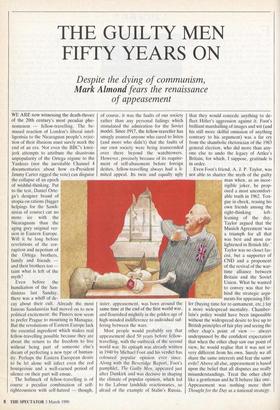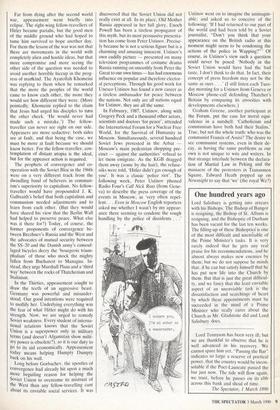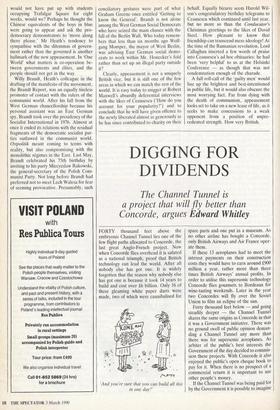THE GUILTY MEN FIFTY YEARS ON
Despite the dying of communism,
Mark Almond fears the renaissance
of appeasement
Even before the humiliation of the San- dinistas last Sunday, there was a whiff of de- cay about their cult. Already the most famous Sandanistas had moved on to new political excitement: the Pinters now seem to prefer Prague to mourning in Managua. But the revolutions of Eastern Europe lack the essential ingredient which makes real fellow-travelling possible because they are about the return to the freedom to live without being part of someone else's dream of perfecting a new type of human- ity. Perhaps the Eastern European desire to be let alone will infect even the red bourgeoisie and a well-earned period of silence on their part will ensue.
The hallmark of fellow-travelling is of course a peculiar combination of self- righteousness with self-hatred — though, of course, it was the faults of our society rather than any personal failings which stimulated the admiration for the Soviet model. Since .1917, the fellow-traveller has smugly assured anyone who cared to listen (and more who didn't) that the faults of our own society were being transcended over there beyond the watchtowers. However, precisely because of its require- ment of self-abasement before foreign deities, fellow-travelling always had a li- mited appeal. Its twin and equally ugly sister, appeasement, was born around the same time at the end of the first world war, and flourished mightily in the golden age of high-minded indifference to individual suf- fering between the wars.
Most people would probably say that appeasement died 50 years before fellow- travelling, with the outbreak of the second world war. Its epitaph was already written in 1940 by Michael Foot and his verdict has coloured popular opinion ever since. Along with the Beveridge Report, Foot's pamphlet, The Guilty Men, appeared just after Dunkirk and was decisive in shaping the climate of popular opinion, which led to the Labour landslide reactionaries, so afraid of the example of Stalin's Russia,
that they would concede anything to de- flect Hitler's aggression against it. Foot's brilliant marshalling of images and wit (and his still more skilful omission of anything contrary to his argument) was a far cry from the shambolic rhetorician of the 1983 general election, who did more than any- one else to undo the legacy of Attlee's Britain, for which, I suppose, gratitude is in order.
right-thinking left- leaning of the day, Taylor argued that the Munich Agreement 'was a triumph for all that was best and most en- lightened in British life.' Taylor was no closet fas- cist, but a supporter of CND and a proponent of the revival of the war- time alliance between Britain and the Soviet Union. What he wanted to convey was that be- hind the strategic argu- ments for appeasing Hit- ler (buying time for re-armament, etc,) lay a more widespread mentality. Chamber- lain's policy would have been impossible without the widespread desire to live up to British principles of fair play and seeing the other chap's point of view — always underpinned by the confident expectation that when the other chap saw our point of view, he would realise that it was not so very different from his own. Surely we all share the same interests and fear the same evils? Above all else, appeasement is based upon the belief that all disputes are really misunderstandings. Treat the other chap like a gentleman and he'll behave like one. Appeasement was nothing more than Thought for the Day as a national strategy. Far from dying after the second world war, appeasement went briefly into eclipse. The right-wing fellow-travellers of Hitler became pariahs, but the good men of the middle ground who had hoped to tame him survived to hope another day. For them the lesson of the war was not that there are movements in the world with completely alien and hostile ideas, but that more compromise and more seeing the other side of the question was needed to avoid another horrible hiccup in the prog- ress of martkind. The Ayatollah Khomeini was replying to them when he remarked that the more the peoples of the world came to know each other, the more they would see how different they were. (More pointedly, Khomeini replied to the claim that Jesus had urged his disciples to turn the other cheek. 'He would never had made such a mistake.') The fellow- traveller can never see right on our side. Appeasers are more seductive: both sides are at fault, and that being the case, we must be more at fault because we should know better, For the fellow-traveller, con- templation of distant utopia is the ideal, but for the appeaser action is required.
The prophets of convergence and co- operation with the Soviet Bloc in the 1960s were on a very different track from the dwindling band of believers in commun- ism's superiority to capitalism. No fellow- traveller would have propounded J. K. Galbraith's belief that both capitalism and communism needed adjustments and to learn from each other. (But they would have shared his view that the Berlin Wall had helped to preserve peace. What else was it there for?) Today, of course, the former proponents of convergence be- tween Brezhnev's Russia and the West and the advocates of mutual security between the SS-20 and the Danish army's camouf- laged bicycles decry the 'bourgeois trium- phalism' of those who mock the mighty fallen from Bucharest to Managua. In- stead, they urge Marshall Plans and a 'third way' between the rocks of Thatcherism and Stalinism.
In the Thirties, appeasement sought to draw the teeth of an aggressive beast. Germany was powerful and misunder- stood. Our good intentions were required to mollify her. Underlying everything was the fear of what Hitler might do with his strength. Now, we are urged to remedy Soviet weakness. Every student of interna- tional relations knows that the Soviet Union is a superpower only in military terms (and doesn't Afganistan show milit- ary power is obsolete?), so it is our duty to go to its aid economically. Appeasement today means helping Humpty Dumpty back on his wall.
Long before Gorbachev, the apostles of convergence had already hit upon a much more beguiling reason for helping the Soviet Union to overcome its mistrust of the West than any fellow-travelling cant about its enviable social services. It was discovered that the Soviet Union did not really exist at all. In its place, Old Mother Russia appeared in her full glory, Enoch Powell has been a tireless propagator of this myth, but its most persuasive presenta- tion has come from Peter Ustinov. Precise- ly because he is not a serious figure but is a charming and amusing innocent. Ustinov's own cuddly picture — presented on many television programmes of costume drama Russia running on smoothly from Peter the Great to our own times— has had enormous influence on popular and therefore elector- al perceptions. Through his good work for Unesco Ustinov has found a new career as a tireless ambassador for peace between the nations. Not only are all nations equal for Ustinov, they are all the same.
In February, 1987, Ustinov, along with Gregory Peck and a thousand other actors, scientists and doctors 'for peace', attended the International Forum for a Nuclear Free World, for the Survival of Humanity in Moscow. Simultaneously, several hundred Soviet Jews protested in the Arbat — Moscow's main pedestrian shopping pre- cinct — against the authorities' refusal to let them emigrate. As the KGB dragged them away (some by the hair), the refuse- niks were told, 'Hitler didn't gas enough of you'. It was a classic 'police riot'. The following week, Peter Ustinov phoned Radio Four's Call Nick Ross (from Gene- va) to describe the press coverage of the events in Moscow, as 'very often repel- lent. . . Even in Moscow English reporters asked me whether I wasn't by my appear- ance there seeming to condone the rough handling by the police of dissidents . .
Ustinov went on to imagine the unimagin- able; and asked us to conceive of the following: 'If I had returned to our part of the world and had been told by a Soviet journalist, "Don't you think that your appearance on the British radio at this moment might seem to be condoning the actions of the police in Wapping?" ' Of course, in Ustinov's view such a question could never be posed: 'Nobody in the Soviet Union would have had the bad taste, 1 don't think to do that. In fact, their concept of press freedom may not be the
same as ours . . (I still listen each Tues- day morning for a Ustinov from Geneva or Moscow phone-call defending Thatcher's Britain by comparing its atrocities with developments elsewhere.) Graham Greene, another participant at the Forum, put the case for moral equi- valence in a nutshell: 'Catholicism and communism have both had their Stalins.' True, but not the whole truth: who was the communist Francis of Assisi? The desire to see communist systems, even in their de- cay, as having the same problems as our own is not unique to wits and writers. In that strange interlude between the declara- tion of Martial Law in Peking and the massacre of the protesters in Tiananmen Square, Edward Heath popped up on Newsnight to say that 'we' (the royal We?)
would not have put up with students occupying Trafalgar Square for eight weeks, would we? Perhaps he thought the Chinese equivalents of the boys in blue were going to appear and ask the pro- democracy demonstrators to `move along there please.' Mr Heath's tendency to sympathise with the dilemmas of govern- ment rather than the governed is another hallmark of the new appeasement. In 'One World' what matters is co-operation be- tween governments and elites, and the people should not get in the way.
Willy Brandt, Heath's colleague in the drafting of the manifesto of the movement, the Brandt Report, was an equally tireless promoter of contact with the rulers of the communist world. After his fall from the West German chancellorship because his personal assistant was an East German spy, Brandt took over the presidency of the Socialist International in 1976. Almost at once it ended its relations with the residual fragments of the democratic socialist par- ties outlawed in the communist world. Ostpolitik meant coming to terms with reality, but also compromising with the monolithic regimes in the East. Last May, Brandt celebrated his 75th birthday by inviting to his party Miecyzslaw Rakowski, the general-secretary of the Polish Com- munist Party. Not long before Brandt had preferred not to meet Lech Walesa for fear of seeming provocative. Presumably, such
conciliatory gestures were part of what Graham Greene once entitled 'Getting to know the General'. Brandt is not alone among the West German Social Democrats who have seized the main chance with the fall of the Berlin Wall. Who today remem- bers that less than six months ago Wolf- gang Momper, the mayor of West Berlin, was advising East German social demo- crats to work within Mr. I lonecker's fold rather than set up an illegal party outside it?
Clearly, appeasement is not a uniquely British vice, but it is still one of the few areas in which we can match the rest of the world. It is easy today to snigger at Robert Maxwell's absurdly deferential interviews with the likes of Ceausescu ('How do you account for your popularity?') and to conclude that he will have given offence to the newly liberated almost as generously as he has since contributed to charity on their
behalf. Equally bizarre seem Harold Wil- son's congratulatory birthday telegrams to Ceausescu which continued until last year, but no more so than the Conducator's Christmas greetings to the likes of David Steel. How pleasant to know that friendship can transcend mere ideology! At the time of the Rumanian revolution, Lord Callaghan inserted a few words of praise into Ceausescu's ad hoc obituaries: he had been 'very helpful' to us at the Helsinki Conference — as though that was not condemnation enough of the charade.
A full roll-call of the 'guilty men' would line up the brightest and best-intentioned in public life, but it would also obscure the most worrying fact. Far from dying with the death of communism, appeasement looks set to take on a new lease of life, as it seeks to make concessions to a weak opponent from a position of unpre- cedented strength. How very British.




























































 Previous page
Previous page